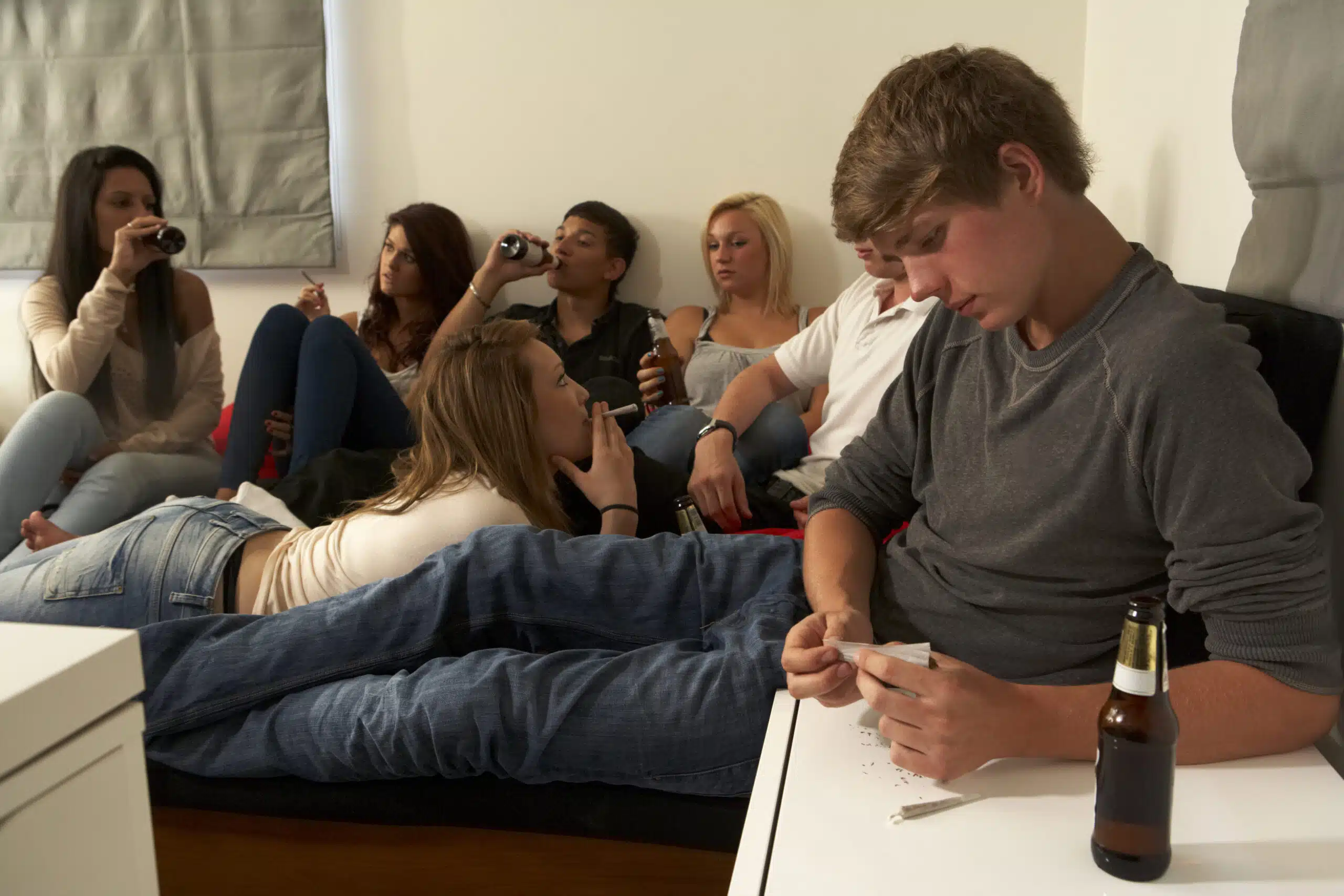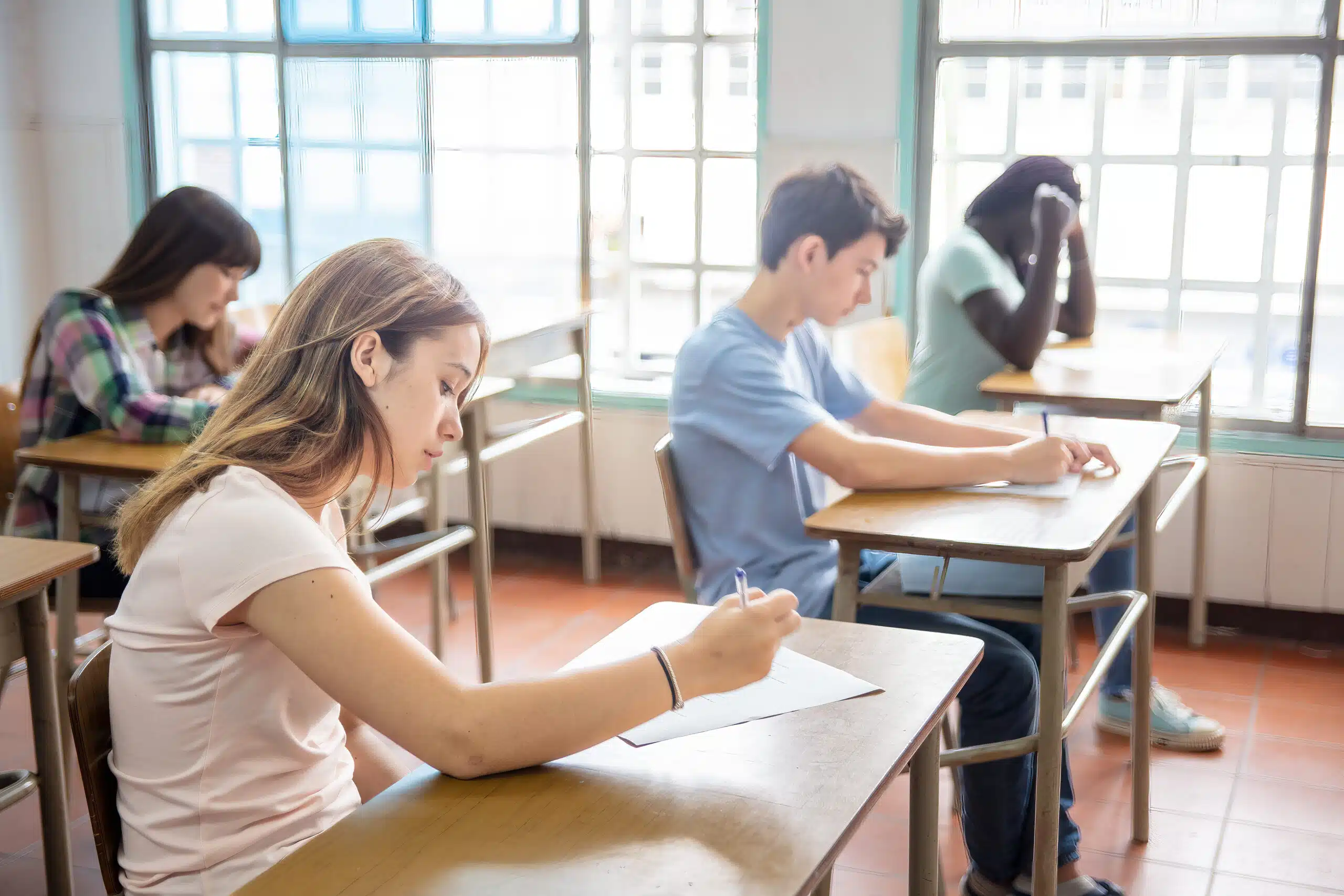
Spotting Social Anxiety During Holiday Season
Social anxiety is stress and nervousness brought on by intense social situations. As the holidays approach, a lot of teens are in situations where they’re surrounded by extra-large crowds of friends and family. Sometimes, they don’t even know everyone who has gathered to celebrate. It is easy to be around those you know, but when you are surrounded by people you don’t know, social anxiety can rear its ugly head.
When a teen experiences social anxiety at a family gathering, their primary fear is judgment. What if they don’t like me? What if I hate them? What if they make fun of me? These and other questions can run rampant in your teen’s mind as they try to cope with the sudden increase of attention. Simply put, they are going to be asked questions – a lot of questions – by relatives they don’t know. Some teens simply aren’t equipped to handle that much interaction at once.
As a parent, you need to not only prepare your kids for a sudden influx of questions and comments from virtual strangers, but you also need to be able to recognize the signs of social anxiety, give your kids some coping mechanisms, or, if necessary, consider getting them some temporary residential treatment.
Preparation for the Holidays
Most kids of all ages love the holidays. However, teens may be reluctant to attend social gatherings with relatives or friends of the family that they don’t know. For healthy adults, who have acquired coping mechanisms, such gatherings are simply a time to talk, share, reminisce, and have a lot of fun. It’s easy for parents to assume that their children will simply have the same experience. But, nothing could be further from the truth.
Unless you live close to your extended family, there are going to be aunts, uncles, cousins, in-laws (and the occasional out-law), and family friends that your kids may have never met or only see at the holidays. They haven’t forged any kind of meaningful relationship with these family members and shouldn’t be expected to “pick up where we left off”. Kids don’t have the necessary shared experiences of a lifetime to build a relationship on.
So, prior to any large family event, sit with your kids and give them some information about who will be there and what they can expect in terms of topics of conversation, who’s likely to ask a lot of questions, and some background on the people they don’t know. Let your kids ask as many questions as they want about the people attending because the more they know, the more comfortable they will be. Don’t be surprised if your kids ask, “How long are we staying?” They will want to know how long they are expected to participate in the gathering. They will also ask because they will want to be with their friends or at least have the chance to text with them.
However, it is a good idea to tell your kids in advance that cell phones won’t be allowed during the event. It is too much of a distraction and you want your kids to be engaged with the family, not texting with friends or playing video games. Let them use your phone if they say they want to take pictures at the gathering. Once your kids are adequately prepared for who will be in attendance and what to expect, you need to learn the signs of social anxiety so you can help your child if they start getting anxious.
Signs of Social Anxiety
Feelings of shyness or discomfort in certain situations don’t automatically mean your child has social anxiety. Comfort levels in social situations will vary depending on your child’s personality and life experiences. Some kids are naturally reserved, and others are more outgoing.
Some signs and symptoms of social anxiety can include the following:
- Fear of situations in which you may be judged
- Worrying about embarrassing or humiliating yourself
- Intense fear of interacting or talking with strangers
- Fear that others will notice that you look anxious
- Fear of physical symptoms that may cause you embarrassment, such as blushing, sweating, trembling or having a shaky voice
- Avoiding doing things or speaking to people out of fear of embarrassment
- Avoiding situations where you might be the center of attention
- Having anxiety in anticipation of a feared activity or event
- Enduring a social situation with intense fear or anxiety
For younger children, social anxiety may be shown by crying, having temper tantrums, clinging to mom or dad, or refusing to talk in social situations. Physical signs and symptoms can sometimes accompany social anxiety and may include the following:
- Blushing
- Fast heartbeat
- Trembling
- Sweating
- Upset stomach or nausea
- Trouble catching your breath
- Dizziness or lightheadedness
- Muscle tension
Holiday experiences that can cause social anxiety include the following:
- Interacting with unfamiliar people or strangers
- Attending parties or social gatherings
- Starting conversations
- Making eye contact
- Entering a room in which people are already seated
- Eating in front of others
Social anxiety symptoms can change over time and can occur only in certain situations. High-stress times like the holidays are when kids are particularly vulnerable to social anxiety. Children can’t indefinitely avoid situations that produce social anxiety. They need to learn how to push through their anxiousness and nervousness to have an opportunity to enjoy their families. Parents need to offer them some coping mechanisms in case social anxiety starts to set in.
Coping Mechanisms for Social Anxiety
Though parents are not all therapists or psychiatrists, there are some simple coping mechanisms that they can talk to their kids about to help them in intense holiday gatherings.
Realize anxiety is natural. Our bodies are naturally designed to respond to any perceived danger with anxiety. The body and mind cue up the fight or flight response by producing adrenaline. This is normal because, without adrenaline, we can’t perform at our best.
Being concerned about what others think is natural, too. We humans are a social species. We survive by depending on one another. Being afraid of negative judgment helps ensure harmony. And while anxiety runs in families, you don’t have to fall prey to it in social situations. Just remind your teen that he or she will have social anxiety as part of their natural human responses.
Anxiety doesn’t reflect reality. Each one of us experiences negative self-talk – a constant stream of thoughts that affects our moods. Social anxiety thrives on thoughts that exaggerate danger, focus on the worst-case scenario, and assume negative judgments coming from others. We think this way out of habit, but, like most habits, it can be altered.
Encourage your teen to really think about those thoughts. Are they realistic? Do they actually come true – ever? “Anxiety producing thoughts are almost always distortions and exaggerations: Everyone is staring at me…I always sound like a fool…If I make a mistake, I’ll never live it down.”
Remind your teen that the best way to combat negative thoughts is with positive thoughts. Encourage him or her to examine anxiety-producing thoughts with a critical eye and take steps to correct them.
Try relabeling. The way teens feel when they are experiencing social anxiety is nearly identical to how they feel when they are excited. Teens who think “I’m getting anxious,” are nearly guaranteed to create a destructive spiral. But, if they change their thinking to “I’m getting excited,” they will feel more prepared.
Breathe away anxiety. One of the worst things about social anxiety is that it generally leads to a feeling of being completely out of control. Teach your kids to breathe slowly and deeply from the abdomen. This will ease anxiety. They can practice while lying in bed, resting their hands on their abdomen. Teach them to breathe deeply through the nose, counting to four, letting their abdomen rise as they inhale. Their chest should be still. As they breathe out – counting to four – their abdomen should flatten. Repeat as needed.
It is easier to teach this kind of breathing lying down, but once teens have the technique down, they should practice it while sitting up, standing up, and eventually during an anxiety inspiring event. Then, whenever they start to feel anxious, remind them to be aware of their breathing.
Shift your focus. Anxiety turns your teen’s attention inward. His or her heart will race, he or she will worry about their hands shaking, and they will worry about looking nervous. All of this will just serve to increase your teen’s anxiety. Teach your teens to readjust their focus to a task. Explain how giving their undivided attention to someone who is talking to them will help them take their mind off the anxiety they are feeling.
Be willing to experience discomfort. Some things are worth doing even if you’re anxious. Teens will be amazed at what they can achieve while experiencing unpleasant sensations – like social anxiety. It’s possible people will notice a teen’s anxiety; other times, they won’t. Either way, your teen will feel better if he or she simply acts rather than relying on fight or flight.
Tolerate Uncertainty. This is difficult. Most people like to know where things stand. Unfortunately, life doesn’t work that way. Teach your teen that he or she cannot control everything in their world. They won’t be liked by everyone. Not everyone will agree with your actions. Sometimes it is best to go with the flow and learn acceptance.
Even armed with coping mechanisms, teens and kids can still become overwhelmed by social anxiety and need treatment.
When it’s Time for Treatment
When your teen has shown signs of social anxiety and you’ve tried therapy, there may be a need for more intensive treatment. If your teen is having difficulty recovering from social anxiety, and it has become debilitating, it’s time to consider residential treatment.
Teens who suffer from social anxiety can benefit from residential treatment that is tailored specifically to their needs. Psychotherapy is the primary step in treating social anxiety. Medications such as mood stabilizers, anti-depressants, and anti-anxiety drugs are often prescribed. You can also choose alternative and holistic therapies for your teen to help reduce the symptoms. Treatment for social anxiety in a residential facility gives your teen a chance at long-term sustainable change in overcoming their anxiety and regaining healthy social function.
Every facility has its own method for treatment, but the best will offer treatment plans that are individualized according to your child’s needs. Each patient in a residential center will receive one or more therapeutic treatment paths.

Here are some examples that you can expect to find at a residential treatment facility:
Individual psychotherapy. One-on-one psychotherapy is the classic talk treatment that helps teens explore their emotions and experiences that underlie negative feelings and behaviors. Individual therapy is an essential component in treatment for social anxiety.
Cognitive behavioral therapy (CBT). CBT is a very effective and commonly used therapy to treat social anxiety. This type of therapy helps teens retrain their thinking patterns and change their actions, helping them overcome their fear of social situations. Group and family therapy are also provided in residential treatment.
Relational therapy. Social anxiety can wreak havoc on interpersonal relationships. Relational therapy can help teens learn how their relationships, life experiences, and emotions are all connected and take steps to develop healthier relationships.
Family therapy and education. Therapy that involves the family may be a great way to help educate the people most important to your teen about his or her social anxiety and about how to best support your teen.
Acceptance and commitment therapy (ACT). ACT focuses more on accepting unhelpful negative thoughts as they are, rather than trying to replace them with positive thoughts. The aim is to teach teens living with social anxiety to cope with negative thoughts and feelings better instead of replacing those thoughts and feelings.
Relaxation and mindfulness techniques. Alternative and holistic therapies may also be used to treat social anxiety. Most commonly, meditation, yoga, and exercise are employed.
Residential treatment centers are set up for both short-term and long-term treatment. If your child or teen has debilitating social anxiety, these programs could be life-changing.
Conclusion
The holidays are stressful for everyone. However, it is highly stressful for kids and teens who are forced to attend gatherings where there is a strong chance they could experience social anxiety. Help your kids by offering preparation, knowing the signs, and getting them help as needed.
If you suspect that your teen is struggling with social anxiety at any point around the holiday season, get them the help that they need today. Contact their pediatrician for an evaluation and referral to a treatment center like Beachside – where they can receive the attention that they need to manage their social anxiety and learn the coping mechanisms necessary to lead a productive, successful life.




